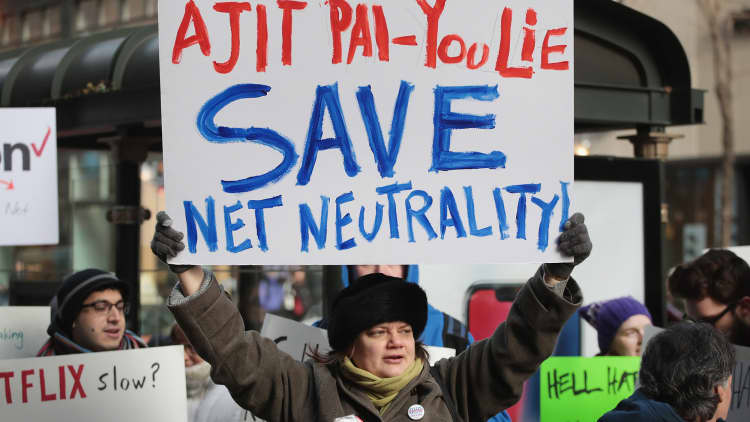
The FCC voted on Thursday to eliminate the Open Internet Order, better known as "net neutrality" regulations.
The decision will give more power to internet service providers (ISPs) to set pricing and prioritize different types of internet traffic.
"For those of you out there who are fearful about what tomorrow will bring, take a deep breath; this decision will not break the internet," FCC Commissioner Michael O'Rielly said. "While repealing net neutrality rules grabs headlines ... net neutrality started as a consumer issue but soon became a stepping stone to impose vastly more common carrier regulation on broadband companies."
O'Rielly said he also hopes Congress considers supporting paid prioritization, specifically pointing to use-cases by autonomous vehicles and medical systems that could benefit from prioritized internet speeds.
The Open Internet Order, which was set in place during President Barack Obama's administration in 2015, required telecommunications and cable companies to treat all online traffic as equal.

Republicans say taking an egalitarian approach discourages ISPs from investing in better infrastructure and technologies to improve the internet. It may also make it harder for smaller ISPs to gain ground. The FCC is currently led by Chairman Ajit Pai, who was appointed to that role by President Donald Trump.
"Title II did not create the open internet, and Title II is not the way to maintain it," FCC commissioner Brendan Carr said. "After a two-year detour, one that has seen investment decline, broadband deployments put on hold, and innovative new offerings shelved, it's great to see the FCC returning to this proven regulatory approach." Carr pointed to the free and open internet that existed before the 2015 Open Internet Order as proof the changes will be successful.
Net neutrality proponents, including many large internet companies, argue that allowing ISPs to prioritize internet traffic differently may drive ISPs to charge more for various activities. For example, because streaming video takes up more bandwidth than reading text-based sites, companies could charge more. Removing the regulations may also allow ISPs to stifle services that compete with their own, including over-the-top streaming platforms such as Netflix.
The FCC commissioners were widely split on the decision. O'Rielly and Carr voted to rescind the Open Internet Order, while commissioners Mignon Clyburn and Jessica Rosenworcel made strongly worded arguments against rescinding it.
"What saddens me the most today is that the agency that is supposed to protect you is actually abandoning you, but what I am pleased to be able to say today is that the fight to save net neutrality does not end today," Clyburn said. "The agency does not have the final word. Thank goodness for that."
"I dissent from the corrupt process that has brought us to this point, and I dissent from the contempt this agency has shown our citizens in pursuing this path today," FCC commissioner Jessica Rosenworcel said. "This decision put this Federal Communications Commission on the wrong side of history, the wrong side of the law, and the wrong side of the American public. The future of the internet is the future of everything. ... I believe it is essential that we sustain this foundation of openness, and that is why I support net neutrality."
Rosenworcel said ISPs will get the power to block websites, throttle content and encourage pay-for-play arrangements with partners while limiting others to "a slow and bumpy road." "Know this: They have the technical ability and business incentive to discriminate and manipulate your internet traffic, and now this agency gives them the legal green light to go ahead and do so. This is not good. Not good for consumers, not good for business, not good for anyone who connects and creates online."
FCC chairman Ajit Pai broke the tie, voting in favor of moving back ISPs under Title I classification.
"The internet is the greatest free-market innovation in history," Pai said. "If our rules deter a massive infrastructure investment that we need, eventually we will pay the price in terms of less innovation. ... It is time for us to restore internet freedom."
WATCH: What is net neutrality? CNBC explains




